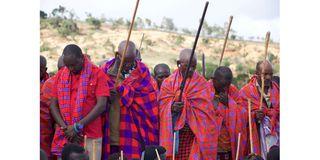African traditional leaders vow to end harmful practices

Maasai elders from Laikipia, in 2018, when they broke the FGM curse and blessed their women and girls. Traditional, religious and civil society leaders in Africa have vowed to end harmful practices in the continent.
What you need to know:
- Traditional, religious and civil society leaders in Africa have embarked on an initiative to end child marriage, FGM and other harmful practices in the continent.
- An AU official observed that even with the change of legislation or improvement in access to services, there is need to change mind-sets and challenge stereotypes.
Traditional, religious and civil society leaders in Africa have embarked on an initiative to end child marriage, Female Genital Mutilation (FGM) and other harmful practices in the continent.
They will partner with the African Union Commission the United Nations and the Spotlight Initiative to make the initiative a success.
The leaders who gathered in the African Union (AU) headquarters in Addis Ababa, Ethiopia, noted that winning the war against harmful practices needs concerted efforts from stakeholders.
AU Acting Director Women, Gender Youth Directorate Prudence Nonkululeko Ngwenya, said violence against women and girls remains one of the critical impediments to realisation of their fundamental rights, including the rights to life, human dignity, peace, justice, and socio-economic and political development.
Challenge stereotypes
The Head of Policy Cooperation at the European Union (EU) delegation to the AU, Thomas Huyghebaert, observed that even with the change of legislation or improvement in access to services, there is need to change mind-sets and challenge stereotypes.
“We need to engage at the community level by engaging men, boys, traditional and religious leaders at the grassroots level,” he said.
According to UN Women, evidence shows that these harmful practices are caused by deep-rooted inequality between men and women, patriarchal beliefs and harmful social norms, poverty and lack of education and awareness.
Letty Chiwara, UN Women Representative to Ethiopia, the African Union Commission and the UN Economic Commission for Africa, noted investing in preventing violence against women and girls is a critical investment for upholding the rights of women and girls.
Partnership
Ms Chiwara observed that traditional leaders have the power to call out the patriarchy embedded in cultural practices and traditions.
“At UN Women, we know we cannot go far if we go alone in our efforts to end violence against women and girls. We are excited that we are now partnering with religious and traditional leaders and we need to hear your experiences and solutions to make this a partnership for change,” she said
The Council of Traditional Leaders of Africa (Cotla) which comprises more than 300 traditional leaders will spearhead the initiative.
It was established in February 2019, to drive the transformation and eradication of negative cultural practices, customs and traditions to end child marriage, FGM and other harmful practices.
Cotla Steering Committee members from six African countries came together for a meeting in Naivasha last month, to discuss how to end violence against women, specifically child marriage and FGM.
Religious leaders
The Convener General of Cotla King Adedapo Aderemi of Nigeria, said the only way to eliminate the vices in the continent is cooperation among countries and stakeholders.
“When we cooperate, we operate. We need to plan and walk the plan to end harmful practices in Africa. We are here to support UN Women because we believe in the cause,” he said.
FGM and child marriages are among the harmful practices women and girls on the continent continue to grapple with. At least one in three young women in Africa are married before they turn 18.
And although there is small progress in changing attitudes toward FGM, the practice remains a major problem across many countries on the continent with about 200 million girls and women having been subjected to the practice.
Across the continent, traditional leaders, including religious leaders, continue to play significant roles as influencers and custodians of cultural practices within communities.





